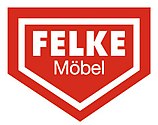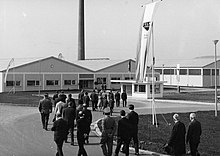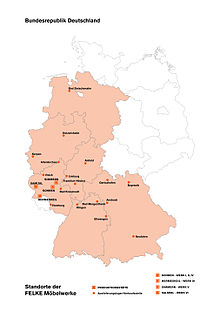Felke Möbelwerke
| FELKE Möbelwerke GmbH & Co. KG
|
|
|---|---|
| legal form | 1928: GmbH later: GmbH & Co. KG |
| founding | 1919 |
| resolution | 2003 |
| Seat | Sohren , Germany |
| Number of employees | 1,500 (1950s to 1970s) |
| sales | 200 million DM (1995) |
| Branch | Furniture manufacturing |
| Website | www.felke-gewerbepark.de |
The Felke Möbelwerke (registered as Michael-Felke Möbelwerke ) was a German furniture production company with headquarters in Sohren in the Hunsrück and nationwide branches. It was one of the first large employers in the Hunsrück and gave the region economic importance.
history
The company had its origins in the municipality of Laufersweiler . Since 1919 the master carpenter Michael Felke has been running a carpentry business with twenty employees. After a fire that destroyed the workshops, the company relocated to neighboring Sohren and expanded rapidly, as it was connected to the network of the Hunsrück Railway at that time . Here by the operation founders Michael and his brother were in 1928 Franz the Felke furniture Werke GmbH & Co.KG founded. In the 1930s, the company experienced steady growth, because it was mass-produced for state and national requirements. In 1933 the company had 100 employees, and at the end of the 1930s it had 400 employees.
Second World War
At the time of the Second World War , production was initially completely converted to beds and, in the last years of the war, to the production of transport boxes for tank shells and the people's gas mask . The Felke Möbelwerke thus became a controlled supplier to the armaments industry. After the war, potato boxes and sewing boxes were made from the surplus .
During the war years the company had around 100 foreign workers from France and the Ukraine. A large part of these foreign workers were seconded to agriculture and other factories in the last years of the war. In autumn 1943 and 1944, some factory buildings were destroyed by Allied aerial bombs.
Boom during the post-war period
At the end of the war, furniture production could be resumed, which was first under US supervision until the late 1940s, then under French supervision. In the next two years, furniture had to be delivered to France as reparations , and in June 1948 the majority of all machines. Due to this reduction in machines, especially for plywood production, the company was quantitatively set back in its production output.
Shortly afterwards, the first halls of the second production plant in Sohren could be built, on which in 1952 the first external plant in Hermeskeil for the production of living rooms was built in quick succession. At the beginning of the 1950s, the company manager founded Felke-Wohnungsbau GmbH , which made it easier for factory workers to settle in the nearby area with over 100 company apartments .
In the late 1950s, the company peaked at 1,500 employees. In the three production plants in Sohren, Simmern and Hermeskeil , 100 bedrooms, 60 living room cupboards and 220 types of kitchen units were manufactured every day.
In 1957 a company pension was introduced for the workers of all production plants , which offered social security in the then economically weak Hunsrück.
From 1962 the Felke-Möbelwerke produced complete kitchens of modern standards, which were later manufactured under the own brand Juwel Küchen in the newly opened kitchen factory in Simmern. A third external plant was inaugurated in Salmtal ( Eifel ) in 1966 .
The Felke furniture works were with their three outdoor works in the field of employment and the rate of production for the largest furniture manufacturing in the country Rhineland-Palatinate . A total of six plants produced from the mid-1960s, three of which were located in Sohren and one each in Hermeskeil, Simmern and Salmrohr. At the end of the 1960s, the company's founder Michael Felke left the management of the company to his three sons Aloys , Walter and Günter Felke . In 1972, Felke-Möbel Vertrieb KG , later GmbH, was founded for the nationwide furniture wholesalers, from which a total of 17 independent furniture centers were exhibiting nationwide. In the 1970s, the plants exported to the whole of Western Europe and overseas. At the end of the 1980s, the company quickly gained a foothold in Eastern Germany.
Post-turnaround time

With German reunification in 1990 and the associated demand from the new federal states , production experienced a brief increase in demand. Because of the opening of the Federal Republic of Germany to the eastern market and the associated dumping prices from neighboring eastern countries, the production of Felke-Möbelwerke then had to be gradually reduced. In 1994 the Felke-Möbelwerke had a workforce of only 700 employees. As an industrial example in the Hunsrück, the Felke works were visited several times by incumbent state and economics ministers until the 1990s . At the beginning of the same decade, Como Möbelzentrum GmbH & Co.KG was founded, which, under a new name, sold residual stocks and purchased furniture, furnishings, antiques and floor coverings to end consumers in a total of ten centers. In the mid-1990s, the Felke self-service furniture stores were set up for private buyers. Since the late 1990s, more and more layoffs followed. In 2001, the last factory closings of the remaining production facilities in Sohren, Simmern and Hermeskeil began. With the sale of the Hermeskeil plant, production was continued there for a short time under the same name with a new owner.
In 2003, Felke-Möbel Vertrieb GmbH , the self-service markets and Como Möbelzentren GmbH & Co.KG were liquidated. The name and logo were sold to an interior design company in Kirchberg .
For the leasing, administration, acquisition and facility management of a total of 170,000 square meters of commercial halls on almost 400,000 square meters of land in five federal states, the Felke industrial park was founded in 2001 , which is managed by the three managing directors in the third generation.
Major fires at the Hermeskeil plant
On February 28, 2005, there was a major fire in the former factory in Hermeskeil , which, according to the Trier Criminal Investigation Department, was probably due to the operation of a wood stove. The complete burnout of a 1,800 square meter hall and 25 cars resulted in property damage of around 1.5 million euros.
On the night of October 25th to 26th, 2008 there was another fire in a warehouse in which 150 firefighters and 45 helpers from the technical relief organization were on duty. The resulting damage was estimated by the police at several 100,000 euros.
Web links
Individual evidence
- ^ Laufersweiler, History of a Hunsrückdorf , Series 22, Fritz Schellack, Argental 1994
- ↑ a b c d e April 18, 1895–1995, Michael Felke 100 years, pioneer of the industrial settlement in the Hunsrück , Rhein-Zeitung from 22/23. April 1995
- ↑ Felke Möbel insolvent: trade activities not affected Möbel Kultur from October 11, 2001
- ↑ Felke is now closing all factory gates , Rhein-Zeitung of October 12, 2001
- ↑ Cause of fire: Wood stove article from the Trierischer Volksfreund of March 5, 2005
- ↑ Press reports on the major fire in 2005 ( page no longer available , search in web archives ) Info: The link was automatically marked as defective. Please check the link according to the instructions and then remove this notice.
- ↑ Ignition in the fire of a former furniture factory. Detailed report of the volunteer fire brigade Hermeskeil 2005
- ↑ Report on the major fire at Felke in Hermeskeil bak.feuerwehr-hermeskeil.de/ from October 26, 2008
- ↑ Fire investigations in a former furniture factory continue to Trierischer Volksfreund from October 26, 2008





